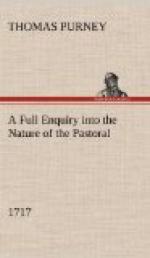To preserve this Simplicity, we must avoid attributing to our Swains, any of those Passions or Desires, which engage busy and active part of Mankind; as Ambition, and the like. Theocritus therefore, and Virgil, and the generality of his Followers, have rather made their Shepherds sing alternately for a Leathern Pouch, or a Goat, than for the Desire of Praise. And nothing, I believe, but his being unwilling to make his Swains sing for exactly the same Reward, that all since Theocritus, have done, could have made our excellent Phillips alter the Pouch and the Kid, for Praise, in his sixth Pastoral.
Let others meanly stake upon their Skill. Or Kid, or Lamb, or Goat, or what they will; for praise we sing, nor Wager ought beside; And, whose the Praise, let Geron’s, Lips decide.
There are few of even the most violent passions but may be introduc’d into Pastoral, if artfully manag’d and qualify’d by the Poet: As Hatred, if it be not carried to it’s height; which is an Excess in Pastoral. And I observe, Cubbin, you make your Shepherd Colly, inconstant; and have an Aversion to his former Sweet-heart Soflin, on account of her Frankness, and too great Forwardness. But yet I think it is not faulty, because you make his Affections vary, against his Inclination, and he is angry with himself for his dislike to Soflin; but no Reason can stop unruly Love.
So Revenge, if admitted, must be very ingeniously manag’d, or ’twill be intolerable. There is a cunning Thought in Tasso, that may perhaps let the Reader something into the Manner in which I would have it order’d. A Female Warriour, opposed to her Lover in Aims, for his Inconstancy shoot’s a Dart at him, yet wishes it may not strike him.
But what comes nigher to the explaining the manner of introducing Revenge into Pastoral, is what we find in the sixth Idyll of Theocritus. Polyphemus’s Mistress had been unkind; and how do’s he propose to take Revenge: Why, he will not take notice of her as she walk’s before his Cave to be seen, and pelt’s his flock. After which follow’s the most simple, and I had almost said, finest Thought in any Pastoral-Writer. The whole Beauty of which no one will conceive, but who has a Soul as tender as Theocritus had, and could touch the Soft as well. Poliphemus threaten’s several Punishments, after which, follows this. ’Tis as fine in Creech’s Version as the Original.
Besides, my Dog, he is at my Command,
Shall bark at her, and gently bite her
Hand.
What I have said of this, might be said of the other Passions; but I shall insist no longer on this Head. As for the Passions most proper for Pastoral, they are discuss’d elsewhere.
SECT. 3.
What degree of Knowledge we may attribute to our Swains.




